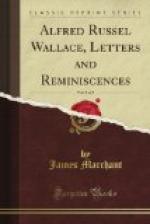* * * * *
W.E. GLADSTONE TO A.R. WALLACE
Hawarden Castle, Chester. October 18, 1895.
Dear Sir,—Your kindness in sending me your most interesting article draws on you the inconvenience of an acknowledgment.
My pursuits in connection with Homer, especially, have made me a confident advocate of the doctrine that there is, within limits, a connection in language between sound and sense.
I would consent to take the issue simply on English words beginning with st. You go upon a kindred class in sn. I do not remember a perfectly innocent word, a word habitually used in bonam partem, and beginning with sn, except the word “snow,” and “snow,” as I gather from Schnee, is one of the worn-down words.
May I beg to illustrate you once more on the ending in p. I take our old schoolboy combinations: hop, skip and jump. Each motion an ending motion; and to each word closed with p compare the words run, rennen, courir, currere.
But I have now a new title to speak. It is deafness; and I know from deafness that I run a worse chance with a man whose mouth is covered with beard and moustache.
A young relation of mine, slightly deaf, was sorely put to it in an University examination because one of his examiners was secretal in this way.
I will not trouble you further except to express, with misgiving, a doubt on a single point, the final f.
In driving with Lord Granville, who was deaf but not very deaf, I had occasion to mention to him the Duke of Fife, I used every effort, but in no way could I contrive to make him hear the word.
I break my word to add one other particular. Out of 27,000 odd lines in Homer, every one of them expressed, in a sense, heavy weight or force; the blows of heavy-armed men on the breastplates of foes ... [illegible] and the like.—With many thanks, I remain yours very faithfully,
W.E. GLADSTONE.




